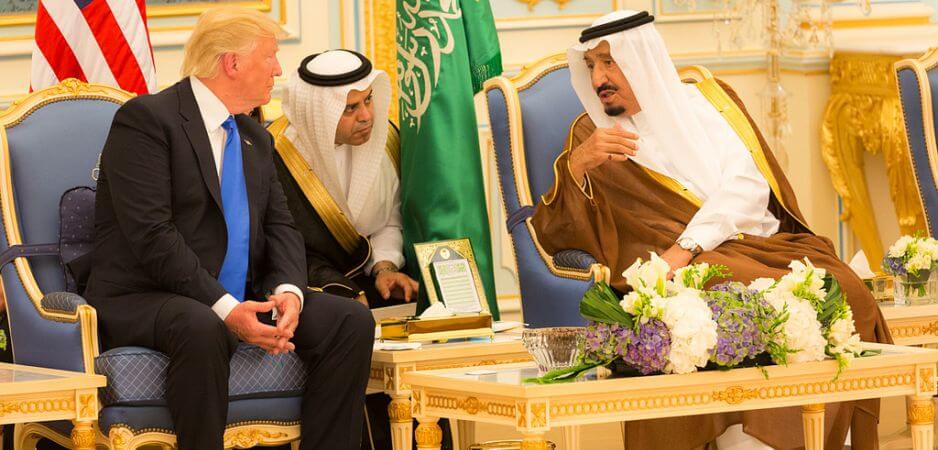President Trump missed an opportunity to address some of the core issues responsible for many of the region’s worst problems, says former US Ambassador Gary Grappo.
As the first destination in his first overseas trip as the new US president, Donald Trump went to Saudi Arabia. It might not have been what many would have predicted after his improbable victory in November 2016. But it wasn’t a bad choice for a president exercising his foreign policy muscles for the first time.
As a presidential candidate, Trump had vilified Muslims, both at home and abroad, threatened to charge the Saudis for America’s “protection” of the kingdom, called for downsizing America’s military presence in the region, and promised to cancel the landmark but highly controversial P5+1 nuclear arms accord with Iran. In Riyadh, however, we heard almost none of that from Trump, the president.
It would seem that even the blunt-speaking Donald Trump follows the convention of all his predecessors. Gone is the campaign rhetoric; now it’s back to business pretty much as usual.
Only, circumstances are not what they were prior to his predecessor’s administration. In fact, they may be decidedly worse. And pouring the old wine of past policy approaches into the new skin of today’s much changed regional political landscape and conditions won’t change that, as much as America’s traditional Sunni partners may wish to partake of that American political potion.
In his remarks before some 50 assembled Arab and Muslim nation leaders, President Trump predictably called on the assembled Arab and Muslim regions to combat “Islamist extremists.” It is, in fact, a festering problem within their midst and one on which the US can assist. But changing the “culture of death” among the region’s extremists — e.g., al-Qaeda and the Islamic State — is not a task that non-Muslim nations can effectively take on. Muslims must lead.
WHAT ABOUT THE DRIVERS OF EXTREMISM?
But employing merely military means will not address the region’s problems of extremism and violence. The authoritarian bargain, by which Arab states have historically governed their nations and in which governments provide for the needs of the people — e.g., health care, security, education and employment — and the latter avoid political involvement, has collapsed. The Arab Spring made that readily apparent to all. Yet there is nothing to replace it; in fact, it’s questionable whether a political philosophy that could buttress new, more responsive and effective systems ultimately accountable to citizens is even evolving.
President Trump failed to deliver that message, and it’s one that needs delivering every bit as directly as his anti-terrorism message. Sadly, it might even be said that the president abdicated America’s heretofore role to advocate on behalf of human rights, the rule of law and democracy by pledging, “we are not here to tell other people how to live, what to do, who to be, or how to worship.” Read: America will no longer push for its own and humanity’s most fundamental values.
Without that vital component, America’s message against terrorism and extremism resembles Russia’s or China’s. If no one — not even the United States — can articulate to Arabs and Muslims at large what an alternative to the Islamism and extremism they confront might be or should reflect, then what choice do they have?
Trump missed a key opportunity not just to articulate a strong message against extremism, as he did, but also to present America’s vision of what an answer might be to this “vile creed” and how to silence its “foot soldiers of evil.”
AND NO MENTION OF THE HISTORIC IRANIAN ELECTIONS?
That wasn’t the only missed opportunity for the US president. He, again predictably, vilified Iran — words doubtlessly music to the ears of his Saudi hosts and many of the other Muslim and Arab leaders.
Yet he failed to capitalize on an historic event that had taken place in Iran just the day before his arrival. This was the Iranian presidential elections, in which the candidate vigorously supported by Iran’s hardliners, including Supreme Leader Ayatollah Ali Khamenei, was soundly defeated by his quasi-reformist opponent, President Hassan Rouhani. The message of that election and Rouhani’s victory could not have been clearer: Like all the peoples of that troubled region, the Iranian people want openness, stability, prosperity and accountability. A modest tip of the hat to Iran’s voters would have been in order.
In urging the Iranian regime to become “a partner for peace,” President Trump would have had no more powerful argument than the results of that election. Iranians, too, want what Arabs and other Muslims desire. He should have used the election results to challenge Iran’s leaders. Now that their people have spoken so resoundingly, it is time to act against the “reckless pursuit of conflict and terror” and in favor of “the Iranian people [and] the just and righteous government they deserve.”
The president should have offered Iranians an exit from the isolated, semi-pariah status they now hold. Instead, he castigated them in the very country guaranteed to unnecessarily aggravate the Iranian leadership and drive them into further isolation.
IRANIAN AND SAUDI ROLES IN COMBATING SECTARIANISM
There is another message President Trump needed to deliver, albeit quietly, to the Saudis and other Gulf leaders. The divide between Sunni and Shia Muslims that is seen in places like Yemen, Iraq, Lebanon, Bahrain, Syria, Saudi Arabia and elsewhere cannot be addressed through hostility. The two primary nations of the Sunni and Shia sects of Islam, Saudi Arabia and Iran, respectively, must find a way to begin talking and looking for ways to end this estrangement. The US and other nations can help encourage that effort, but the two sides must show willingness. Someone needs to be quietly but consistently pushing them. Why not the US?
Trump returned the US to a largely familiar role in the Middle East. That will give comfort to many who doubted candidate Trump’s moxie on foreign policy in the Middle East. But he missed an opportunity to initiate the desperately needed transformation that needs to take place throughout that region if its many ills are to be overcome.
The views expressed in this article are the author’s own and do not necessarily reflect Fair Observer’s editorial policy.
Photo Credit: The White House
Support Fair Observer
We rely on your support for our independence, diversity and quality.
For more than 10 years, Fair Observer has been free, fair and independent. No billionaire owns us, no advertisers control us. We are a reader-supported nonprofit. Unlike many other publications, we keep our content free for readers regardless of where they live or whether they can afford to pay. We have no paywalls and no ads.
In the post-truth era of fake news, echo chambers and filter bubbles, we publish a plurality of perspectives from around the world. Anyone can publish with us, but everyone goes through a rigorous editorial process. So, you get fact-checked, well-reasoned content instead of noise.
We publish 2,500+ voices from 90+ countries. We also conduct education and training programs
on subjects ranging from digital media and journalism to writing and critical thinking. This
doesn’t come cheap. Servers, editors, trainers and web developers cost
money.
Please consider supporting us on a regular basis as a recurring donor or a
sustaining member.
Will you support FO’s journalism?
We rely on your support for our independence, diversity and quality.






